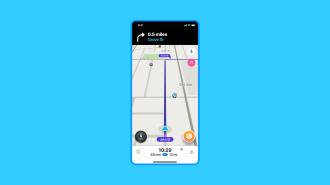Google-owned navigation app Waze has launched a new feature that alerts drivers when they’re approaching an area with a history of car accidents. The idea is that, instead of just helping you steer around accidents, Waze now hopes to help people avoid getting into them in the first place.
Waze’ means: Waze uses your location when you use the app to determine how quickly traffic is moving where you are. It also asks drivers to manually report car accidents, construction, and other issues that can affect the flow of traffic.
Waze’s AI considers both user reports of car accidents and general information about the road.
Rather than just waiting for users to report accidents, Waze is now actively trying to prevent them with a new AI-powered safety feature called “Crash History Alerts.”
The feature lets drivers know when they’re approaching a “crash-prone” segment of road, and it’s powered by an AI that considers past user reports of car accidents and general information about the road ahead, such as its typical traffic levels and whether it includes a curve.
Presumably, the idea is that the alert will let drivers know to be hyper-vigilant while driving along the historically crash-prone route or perhaps encourage them to avoid it altogether.
The limits: Because Waze relies on user reports, it might not actually know every area with a history of car accidents.
And because alerts can be distracting, Waze also plans to limit the number of Crash History Alerts it displays — it won’t show them for roads drivers regularly navigate, and if a route includes multiple crash-prone areas, the app will only display alerts for the “most critical” ones.
“Waze aims to give greater peace of mind on every one of your drives.”
Waze
Looking ahead: Waze has been beta testing Crash History Alerts since at least December 2022, and while it hasn’t said whether the feature had any effect on car accidents or how users drive, it presumably was encouraged enough by the trial to fully launch the feature.
“At Waze, we believe driving goes beyond just transportation — it’s about helping every driver make smart decisions on the road,” said Waze. “By continuing to bring more safety features to your rides, Waze aims to give greater peace of mind on every one of your drives.”
We’d love to hear from you! If you have a comment about this article or if you have a tip for a future Freethink story, please email us at tips@freethink.com.
